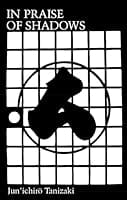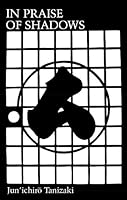In Praise of Shadows
Published:
In Praise of Shadows

Metadata
- Author: Jun'ichirÅ Tanizaki
- Full Title: In Praise of Shadows
- Category: #books
Highlights
- For the solitary eccentric it is another matter, he can ignore the blessings of scientific civilization and retreat to some forsaken corner of the countryside; but a man who has a family and lives in the city cannot turn his back on the necessities of modern life—heating, electric lights, sanitary facilities—merely for the sake of doing things the Japanese way. (Location 32)
- The parlor may have its charms, but the Japanese toilet truly is a place of spiritual repose. (Location 68)
- Our forebears, making poetry of everything in their lives, transformed what by rights should be the most unsanitary room in the house into a place of unsurpassed elegance, replete with fond associations with the beauties of nature. Compared to Westerners, who regard the toilet as utterly unclean and avoid even the mention of it in polite conversation, we are far more sensible and certainly in better taste. (Location 79)
- It was not that I objected to the conveniences of modern civilization, whether electric lights or heating or toilets, but I did wonder at the time why they could not be designed with a bit more consideration for our own habits and tastes. (Location 103)
- And indeed for even the sternest ascetic the fact remains that a snowy day is cold, and there is no denying the impulse to accept the services of a heater if it happens to be there in front of one, no matter how cruelly its inelegance may shatter the spell of the day. (Location 112)
- The Westerner has been able to move forward in ordered steps, while we have met superior civilization and have had to surrender to it, and we have had to leave a road we have followed for thousands of years. (Location 132)
- And had we invented the phonograph and the radio, how much more faithfully they would reproduce the special character of our voices and our music. Japanese music is above all a music of reticence, of atmosphere. When recorded, or amplified by a loudspeaker, the greater part of its charm is lost. In conversation, too, we prefer the soft voice, the understatement. Most important of all are the pauses. Yet the phonograph and radio render these moments of silence utterly lifeless. And so we distort the arts themselves to curry favor for them with the machines. (Location 141)
- Almost every householder has had to scold an insensitive maid who has polished away the tarnish so patiently waited for. (Location 154)
- We do not dislike everything that shines, but we do prefer a pensive luster to a shallow brilliance, a murky light that, whether in a stone or an artifact, bespeaks a sheen of antiquity. (Location 168)
- this “sheen of antiquity” of which we hear so much is in fact the glow of grime. In both Chinese and Japanese the words denoting this glow describe a polish that comes of being touched over and over again, a sheen produced by the oils that naturally permeate an object over long years of handling—which is to say grime. If indeed “elegance is frigid,” it can as well be described as filthy. (Location 170)
public: true
title: In Praise of Shadows longtitle: In Praise of Shadows author: Jun'ichirÅ Tanizaki url: , source: kindle last_highlight: 2024-02-04 type: books tags:
In Praise of Shadows

Metadata
- Author: Jun'ichirÅ Tanizaki
- Full Title: In Praise of Shadows
- Category: #books
Highlights
- For the solitary eccentric it is another matter, he can ignore the blessings of scientific civilization and retreat to some forsaken corner of the countryside; but a man who has a family and lives in the city cannot turn his back on the necessities of modern life—heating, electric lights, sanitary facilities—merely for the sake of doing things the Japanese way. (Location 32)
- The parlor may have its charms, but the Japanese toilet truly is a place of spiritual repose. (Location 68)
- Our forebears, making poetry of everything in their lives, transformed what by rights should be the most unsanitary room in the house into a place of unsurpassed elegance, replete with fond associations with the beauties of nature. Compared to Westerners, who regard the toilet as utterly unclean and avoid even the mention of it in polite conversation, we are far more sensible and certainly in better taste. (Location 79)
- It was not that I objected to the conveniences of modern civilization, whether electric lights or heating or toilets, but I did wonder at the time why they could not be designed with a bit more consideration for our own habits and tastes. (Location 103)
- And indeed for even the sternest ascetic the fact remains that a snowy day is cold, and there is no denying the impulse to accept the services of a heater if it happens to be there in front of one, no matter how cruelly its inelegance may shatter the spell of the day. (Location 112)
- The Westerner has been able to move forward in ordered steps, while we have met superior civilization and have had to surrender to it, and we have had to leave a road we have followed for thousands of years. (Location 132)
- And had we invented the phonograph and the radio, how much more faithfully they would reproduce the special character of our voices and our music. Japanese music is above all a music of reticence, of atmosphere. When recorded, or amplified by a loudspeaker, the greater part of its charm is lost. In conversation, too, we prefer the soft voice, the understatement. Most important of all are the pauses. Yet the phonograph and radio render these moments of silence utterly lifeless. And so we distort the arts themselves to curry favor for them with the machines. (Location 141)
- Almost every householder has had to scold an insensitive maid who has polished away the tarnish so patiently waited for. (Location 154)
- We do not dislike everything that shines, but we do prefer a pensive luster to a shallow brilliance, a murky light that, whether in a stone or an artifact, bespeaks a sheen of antiquity. (Location 168)
- this “sheen of antiquity” of which we hear so much is in fact the glow of grime. In both Chinese and Japanese the words denoting this glow describe a polish that comes of being touched over and over again, a sheen produced by the oils that naturally permeate an object over long years of handling—which is to say grime. If indeed “elegance is frigid,” it can as well be described as filthy. (Location 170)
New highlights added August 11, 2024 at 11:42 PM
- And I realized then that only in dim half-light is the true beauty of Japanese lacquerware revealed. (Location 189)
- Darkness is an indispensible element of the beauty of lacquerware. (Location 197)
- Artisans of old, when they finished their works in lacquer and decorated them in sparkling patterns, must surely have had in mind dark rooms and sought to turn to good effect what feeble light there was. Their extravagant use of gold, too, I should imagine, came of understanding how it gleams forth from out of the darkness and reflects the lamplight. (Location 202)
- Our cooking depends upon shadows and is inseparable from darkness. (Location 242)